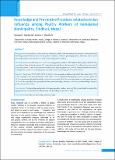Please use this identifier to cite or link to this item:
https://hdl.handle.net/20.500.14356/1729| Title: | Knowledge and Preventive Practices related to Avian Influenza among Poultry Workers of Kamalamai Municipality, Sindhuli, Nepal |
| Authors: | Shrestha, R Shrestha, K B Ghimire, S Shrestha, N |
| Citation: | ShresthaR., ShresthaK. B., GhimireS., & ShresthaN. (2016). Knowledge and Preventive Practices related to Avian Influenza among Poultry Workers of Kamalamai Municipality, Sindhuli, Nepal. Journal of Nepal Health Research Council. https://doi.org/10.33314/jnhrc.v0i0.718 |
| Issue Date: | 2016 |
| Publisher: | Nepal Health Research Council |
| Article Type: | Original Article |
| Keywords: | Avian influenza Knowledge Practice Nepal |
| Series/Report no.: | Jan-April, 2016;718 |
| Abstract: | Abstract Background: Avian influenza (AI) is currently a threat to global health. Prevention and control of AI depends on the knowledge and preventive practices of the poultry workers as well as of general population. This study aims to assess knowledge and preventive practices related to AI among poultry workers. Methods: Cross-sectional study was carried out among poultry workers of Kamalamai Municipality, Sindhuli. Data was collected from randomly selected 122 respondents through face-to-face interview. The collected data was entered in Epi-data version 3.1 and analyzed in terms of descriptive statistics (proportion, 95% CI, mean and standard deviation) by using SPSS, version 20. A scoring system was used to assess knowledge and preventive practices. Results: Out of total, 93.4% (95% CI, 87.6- 96.6%) of the respondents had heard about AI. More than half (54.9%) of the respondents had poor knowledge on AI. Only 5.3% of respondents had good preventive practice against AI. 30.3% respondents had good knowledge and good practice and 24.6% had poor knowledge as well as poor practice. 20.5% of the respondents had good practice but poor knowledge, whereas, 24.6% had good knowledge but poor practice towards prevention. Conclusions: The knowledge and practice of AI among poultry workers were low. The groups should be targeted for appropriate intervention based on whether they lack knowledge or practice or both. Keywords:Avian influenza; knowledge; practice; Nepal. |
| Description: | Original Article |
| URI: | http://103.69.126.140:8080/handle/20.500.14356/1729 |
| ISSN: | Print ISSN: 1727-5482; Online ISSN: 1999-6217 |
| Appears in Collections: | Vol. 14 No. 1 Issue 32 Jan - Apr 2016 |
Files in This Item:
| File | Description | Size | Format | |
|---|---|---|---|---|
| 718-Article Text-1353-2-10-20160608.pdf | Fulltext Download | 193.62 kB | Adobe PDF |  View/Open |
Items in DSpace are protected by copyright, with all rights reserved, unless otherwise indicated.
